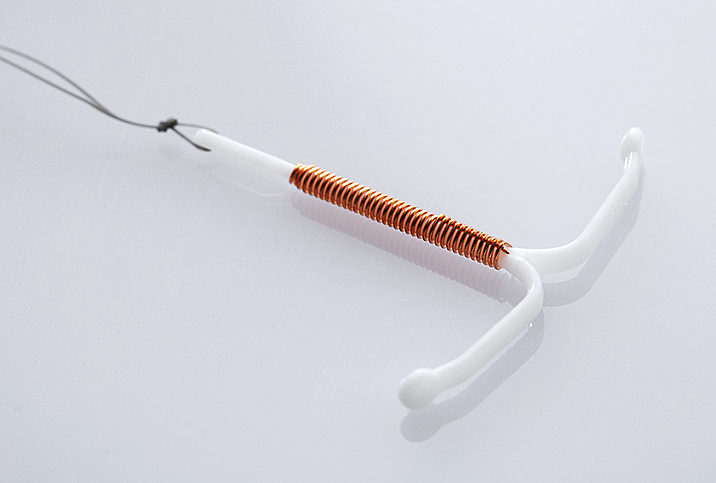My Birth Control Gave Me a Stroke

My story is far from unique. When I was 20 years old, my estrogen-based birth control caused a chain reaction in my body, ultimately resulting in several strokes, heart surgery and a punishing hospital bill.
If you take birth control regularly or are considering it, please read this—if only as a cautionary tale—so you make sure you’re making the best possible decision.
About those side effects…
We all know that different types of birth control have different side effects, but do we really consider what those side effects might be?
Before I started birth control, I remember watching television ads for various contraceptive medicines. The voice listing side effects in these commercials was so comically fast, it might as well have been a low buzz in the background. I might have caught a word or two (“headaches” or “blurry vision”), maybe even a phrase (“if you’re pregnant or nursing”), but the overall message of words I could clearly make out in these ads amounted to this: “Birth control is safe!” and “Don’t worry about side effects—they probably don’t apply to you!”
It wasn’t until after suffering multiple strokes, self-administering shots of blood-thinning medication and paying down my sky-high hospital bills that I thought to question two aspects: Was I, in fact, the person to whom side effects applied? And should I have been listening more carefully as the ads raced through the possible complications at top speed?
My own choices
Let’s start at the beginning. When I began weighing my contraception options, estrogen-based birth control seemed like a logical place to start. After all, it’s the most commonly used form of hormonal birth control available.
I knew I didn’t have any serious preexisting conditions, had never taken birth control before and had never had any serious injuries or illnesses. What I didn’t know was that birth control may present a higher risk of stroke for people with migraine headaches, which I suffered from but had never treated. What also wasn’t discussed was the slight bubbly noise my heart made, a mild defect that no one had ever noticed.
Was I, in fact, the person to whom side effects applied?
That combination—a history of chronic migraine headaches, a mild heart defect and estrogen-based birth control—was the dangerous cocktail both my doctor and I missed.
Even without the knowledge I have now, a little more research on my part would have revealed safer, more effective options that would have also helped with other symptoms I was experiencing. But why would I have done that research? After all, endless lists of side effects spoken in soft tones can only alarm you if you think you might actually experience them, and I had no reason to believe I would.
Choosing the right doctor
Contrary to popular belief, doctors are only human. The doctor who prescribed the estrogen-based birth control I was on when all hell broke loose either didn’t know about the risky circumstance we were creating, didn’t think it would affect me since I was so young or maybe just didn’t consider it at all.
After all, birth control is safe, right?
While I believe all doctors have a responsibility to explain the risks of any medication they prescribe, I do not blame my doctor for what happened to me. The information out there about birth control methods is scattered, and many general physicians are not properly educated on everything there is to know about reproductive health care. Unless a doctor is a specialist, he or she may not even know much about the differences between the types of birth control they can prescribe.
That said, you can take a couple of steps to protect yourself. First, I recommend speaking to a female or AFAB (assigned female at birth) physician when seeking birth control. If you can manage to find a physician who also specializes in reproductive health care, even better. But no matter how qualified you believe your doctor to be, you need to educate yourself, as well. While trusting medical professionals to listen and provide treatment may usually work out, it doesn’t always, especially for AFAB people.
Be your own advocate
I’ve always been a person who admires healthcare professionals. I even dreamed of becoming a doctor myself. Considering the respect I have for people in the healthcare industry, I was shocked at how I was treated during my time in the hospital.
When I first arrived at the hospital, I was able to walk and see just fine. I had my first stroke—a TIA, or transient ischemic attack, which is more like a “mini-stroke”—at my cousin’s house. I lost all vision in my right eye and my right side went completely numb. I could still move my right arm and leg, but it felt like how you move in a dream: completely sluggish and ineffective. Perhaps because of my own personal interest in medicine, I immediately knew that I was having a mild stroke and needed to go to the doctor right away.
By the time I got to the hospital, however, the clot had passed and I was fine again. When I told the nurse at intake that I had just had a stroke, she was skeptical. In fact, I was in the process of being discharged when I had my second TIA. By the time I had a third one, they were filling me full of a blood-thinner called warfarin and rolling me around the hospital for various brain scans.
Be your own expert
The point of this story is not that we cannot trust healthcare professionals. My point is that healthcare workers are people, too. Ultimately, you are the only expert on your body. The more you understand your body, the better you can advocate for yourself and get the help you need. If I had been unable to advocate for my needs back then, I may have never obtained the help I desperately needed.
When it comes to reproductive health care, too often the message is that oral contraception is completely safe, we shouldn’t worry about it and there’s no need to ask questions. That may be true for a high percentage of women, but I can attest that it’s not true for everyone.
It’s definitely important to tell your doctor about any conditions or symptoms you may have before birth control is prescribed. Any medication can have side effects. However, more women die of childbirth complications than birth control pill complications.
I believe strongly that the best course of action all of us can take to stay safe, especially when making decisions about our own bodies, is to educate ourselves and speak up when we aren’t being heard.


















